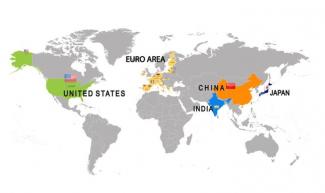
Singapore, 11 September 2019 (Wednesday) – The health of the biggest five economies in the world is clearly of interest to businesses, the public sector and general public in Singapore, one of the world’s most open and trade-dependent economies.
The Sim Kee Boon Institute for Financial Economics (SKBI) at Singapore Management University (SMU) has launched a new biannual survey highlighting the spectrum of factors that impact the economies of China, Euro Area, India, Japan and the United States.
The SKBI Big5 survey has been jointly developed by Professor Dave Fernandez, Director of SKBI, and Mr Tom Lam, Principal Researcher of SKBI, to focus on the multiyear outlook and assessment of the biggest five economies in the world. The emphasis, contents and diversity of the Big5 survey are unique, unlike other available surveys in the market. The Big5 survey also seeks to establish a recurrent platform in Singapore for a diverse group of participants to explore the relevant risks and opportunities surrounding the global economic landscape.
The inaugural Big5 survey, conducted in August, has the following varied list of participants: Bank of Singapore, DBS Group, GIC, ING Bank NV, Moody’s Investors Service, TD Securities, UBS, and United Overseas Bank Group.
According to researchers at SKBI, one overall interpretation of the multiyear Big5 survey results implies that India’s economy might be deemed least at-risk on balance, while the Euro Area economy appears to be the most at-risk. Our so-called economy-at-risk scale, in descending order, is as follows: India, China, US, Japan and Euro Area.
Broadly, survey participants expect the risks to GDP growth to be tilted to the downside in 2019 and 2020 followed by a more balanced risk assessment for growth in 2021. On inflation, participants seem to lean toward a more balanced risk assessment from 2019 through 2021, with the exception of the Euro Area, where a modest majority view greater disinflationary risks in 2019 and 2020.
The researchers at SKBI also note that perhaps in light of reduced policy leeway, participants anticipate policymakers in Japan to be generally more reluctant on pursuing additional policy stimulus (monetary and fiscal). Although participants appear to view Euro Area policymakers to be less hesitant on fresh stimulus measures (monetary and fiscal), policy efficacy might be an increasingly crucial issue going forward.
###
For more information, please contact
|
Teo Chang Ching (Mr) Senior Assistant Director Corporate Communications DID: 6828 0451 Email: ccteo [at] smu.edu.sg |
|
|